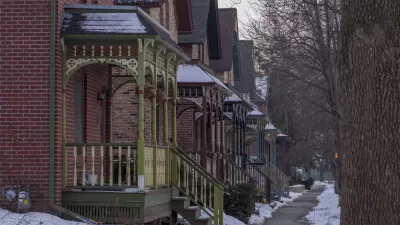After losing a court battle with environmental groups, the city must revert to the land use regulations in its 2030 plan.

The Minneapolis 2040 Comprehensive Plan, once hailed by housing reform advocates for its elimination of single-family zoning, has been officially shelved as a court deadline passed last weekend, reports Tommy Wiita for Bring Me the News.
The city now has to revert to its 2030 plan after environmental groups successfully challenged the plan in court under the Minnesota Environmental Rights Act (MERA), arguing that the land use changes in the plan would harm local ecosystems and pollute waterways.
“Some of the housing developments put forward under the 2040 plan will have to change under the old ordinances, causing some uncertainty for multiple projects,” Wiita adds, noting that, “since [Minneapolis 2040] was implemented three years ago, the city has seen an uptick in construction that has kept housing and rental prices more affordable at a time when inflation in other cities has skyrocketed.” The city says it will lose almost $10 million in funds already invested in affordable housing projects that will no longer be permitted.
According to an article by Susan Du in the Star Tribune, not all environmental groups agree with the ruling. “The Sierra Club, which filed an amicus brief in support of 2040, argued the plan's goals of increasing housing density along transit corridors would reduce carbon emissions by eliminating the need to own a car.”
FULL STORY: Minneapolis sets aside 2040 Comprehensive Plan after judge ruling goes into effect

Alabama: Trump Terminates Settlements for Black Communities Harmed By Raw Sewage
Trump deemed the landmark civil rights agreement “illegal DEI and environmental justice policy.”

Planetizen Federal Action Tracker
A weekly monitor of how Trump’s orders and actions are impacting planners and planning in America.

The 120 Year Old Tiny Home Villages That Sheltered San Francisco’s Earthquake Refugees
More than a century ago, San Francisco mobilized to house thousands of residents displaced by the 1906 earthquake. Could their strategy offer a model for the present?

In Both Crashes and Crime, Public Transportation is Far Safer than Driving
Contrary to popular assumptions, public transportation has far lower crash and crime rates than automobile travel. For safer communities, improve and encourage transit travel.

Report: Zoning Reforms Should Complement Nashville’s Ambitious Transit Plan
Without reform, restrictive zoning codes will limit the impact of the city’s planned transit expansion and could exclude some of the residents who depend on transit the most.

Judge Orders Release of Frozen IRA, IIJA Funding
The decision is a victory for environmental groups who charged that freezing funds for critical infrastructure and disaster response programs caused “real and irreparable harm” to communities.
Urban Design for Planners 1: Software Tools
This six-course series explores essential urban design concepts using open source software and equips planners with the tools they need to participate fully in the urban design process.
Planning for Universal Design
Learn the tools for implementing Universal Design in planning regulations.
Clanton & Associates, Inc.
Jessamine County Fiscal Court
Institute for Housing and Urban Development Studies (IHS)
City of Grandview
Harvard GSD Executive Education
Toledo-Lucas County Plan Commissions
Salt Lake City
NYU Wagner Graduate School of Public Service





























